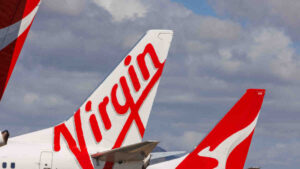UBS says the best insurance against a recession is… probably insurance

I for one am shocked. Via Getty
Some pretty weird stuff has been happening on the economic front of late. Nevertheless, the sharp shooting economists at UBS say their “base case” is still that Australia avoids a hard landing.
But they do not sound convinced, or that convincing.
The first rider on this declaration made late last week was to acknowledge that “the risks of an economic recession are non-trivial” and will continue to weigh on the equity market.
Like not having cancer yet weighs on the lifetime smoker.
But like any decent investment bank, UBS appears to be having it both ways, adding that more recent developments – like the RBA’s trajectory of rate hikes, and soft retail updates – also reinforce their concurrent view “that soft landing hopes are sliding.”
QED: “…an increasingly defensive investment stance is warranted.”
“Valuations of domestic macro sectors are not priced for a recession, with PE ratios still sitting above mid-cycle levels. Previous recession risk periods saw single digit multiples through consumer and banking stocks, and although we don’t expect such a compression to valuations in this cycle (given bond yields are still low by historical standards), current ratios still look unrealistically optimistic, and ill-prepared for the further earnings downgrades,” the bank warns.
Perhaps most interestingly UBS says – contrary to popular perception – the end of an RBA hiking cycle like this one doesn’t necessarily ‘herald a revival from cyclical equities.’
Consumer-detached stocks
Looking at the performance of Australian equities through previous RBA ‘rate-plateau’ periods, UBS notes that amid overall market falls, the stocks which are most exposed to the domestic economy continue to underperform defensive sectors.
“The most cyclical sectors and styles only start performing closer to the period where the RBA is cutting.”
In their view, this leaves a big tick for the less cyclical components of the ASX200 “that are detached from the consumer”:
1. Technology
2. Insurance
3. Healthcare
4. Infrastructure and Utilities

UBS’ overweight stance on the Healthcare sector has prompted it to add CSL (ASX:CSL) to its most preferred stock list with the business experiencing commercial tailwinds in all divisions.
ResMed (ASX:RMD) also joins on an improving product mix that should see gross margins returning to pre-Covid levels.
The ASX (ASX:ASX) itself and Super Retail (ASX:SUL) have been added to UBS’ least preferred list.
Of the stocks which UBS identifies as most vulnerable to a consumer slowdown, the following feature prominently among the many which are still trading at 20% or more above year-ago prices:
- Building Materials: Brickworks (ASX:BKW), Boral (ASX:BLD, CSR (ASX:CSR)
- Online Classifieds: REA Group (ASX:REA), DOMAIN (ASX:DHG), Carsales.com (ASX:CAR),
- Travel: Qantas (ASX:QAN), Webjet (ASX:WEB)
UBS Global Macro Strategy
What triggers a selloff when a recession is considered consensus?
UBS believe that economic growth is weaker than investors perceive and much weaker than priced in markets. Eventually, this will lead to lower earnings estimates – for now, companies are carrying over easy financing and a strong backlog of orders. Thus, it will likely take up to Q3 earnings for market estimates to be revised downwards.
The 2024 earnings estimate of $246 per share looks much too high in their opinion.
Notwithstanding this, UBS believe that earnings estimates are out of kilter with reality, with Tech earnings growth already expected to be ~2% higher than in the previous decade, and these high earnings are being valued at a multiple consistent with real rates at -0.8%, more than 230bps lower than where real rates are currently priced.
A US recession is widely considered “consensus” and thought to bring about weaker earnings, and therefore, weaker equities. However, that’s not been the case at all.
Gangbusters US markets got off to a strong start this year thanks to economic growth surprising to the upside. After global growth surprised at the beginning of the year, global growth is now annualising below 2% (vs a long-term average of 3.5%).
Adding to this, the peak in global inflation was November 2022 and has fallen aggressively since, paving the way for a “central bank pivot/pause/cut” narrative to drive stocks higher.
Part of the issue with these factors is that they are now in reverse – economic growth is coming in weaker than expected as the lagged impact of tighter monetary policy starts to impact.
Consequently, this has resulted in the market all but pricing out central bank pivots – the first Fed rate cut is not priced until May/June, and is, in fact, priced for another hike.
Lastly, the Fed Balance Sheet has again begun to decline, and we are set to see an acceleration of the liquidity drain over the second half as the US Treasury refills its coffers post the debt ceiling.
In essence, this means that valuations will likely get compromised before earnings do.
After this valuation unwind, credit rating downgrades and defaults should be a precursor to weaker earnings (and ultimately, weaker equities).
Health Insurers: a relative haven with growth tailwinds
Following its Private Health Insurance (PHI) Survey for 2023, UBS reckons consumer sentiment towards private health insurance policies has improved to multi-year highs.
Consumer perception of value-for-money in PHI has jumped to its highest levels in five years.
They expect this to underpin further increase in participation and policy numbers into FY24 and that the tailwinds supporting PHIs are more durable and persistent than market expectations.
Historically, greater participation rates have been short-term. However, UBS believes there are more structural drivers at work, including:
1) Public hospital bottlenecks
2) Customer givebacks continuing
3) PHI repricing below CPI
4) Product enhancements (more for less)
Whilst tighter household budgets will inevitably scrutinise PHI costs, the UBS survey results do highlight the handsomely defensive characteristics of the insurance sector.
For Medibank (ASX:MPL), UBS is forecasting 2.8-3.0% increase in policy numbers in FY24-25 (consensus 1.8-2.7%); for NIB Holdings (ASX:NHF), it is forecasting 3.2-3.6% (consensus 3.1%).
UBS adds that better retention and relatively low claims inflation to support above-average net insurance margins all the way into FY25.
This, combined with strong net migration supporting growth, has resulted in a near sector-wide increase to Price Targets – to $4.20 from $4.00 for MPL; and to $9.70 from $9.20 for NIB, the most notable.
Although the stocks are not cheap – Medibank Private and NHF trade between ~18x and ~19x PE multiples respectively, based on UBS FY24 forecasts – “resilient earnings, with upside risk, is likely to see multiples remain elevated.”
Valuations are already capturing a favourable outlook and the bank notes that in the current crappy environment, the PHI sector provides “defensive characteristics, healthy margins and interest rate leverage.”
Earnings are reasonably predictable (relative to other insurance segments) and earnings risks are skewed to the upside if the favourable PHI purchasing intentions evident in the latest UBS survey turn out to be accurate.
UNLOCK INSIGHTS
Discover the untold stories of emerging ASX stocks.
Daily news and expert analysis, it's free to subscribe.
By proceeding, you confirm you understand that we handle personal information in accordance with our Privacy Policy.








